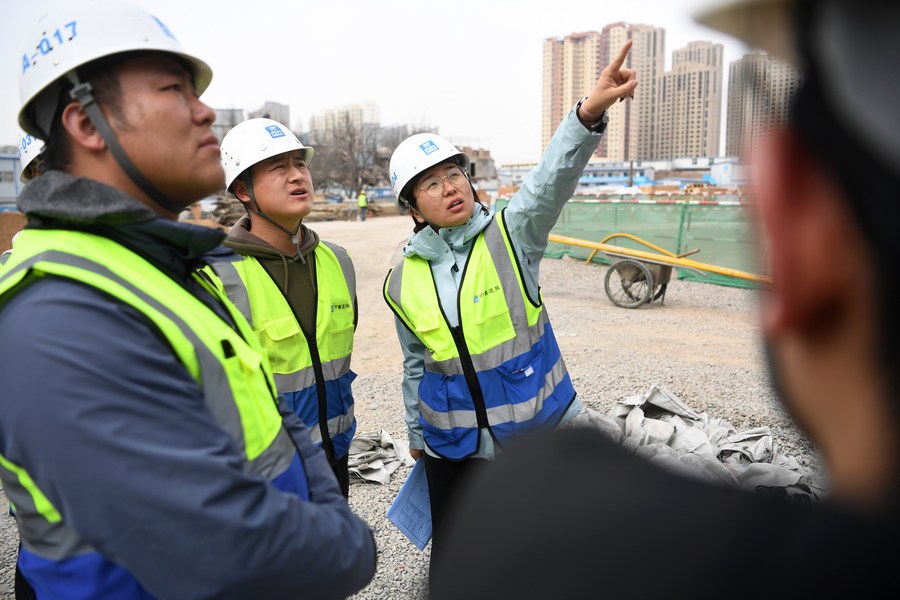
Photo taken on March 4, 2021 shows Du Xuan checks the construction progress in the city of Lanzhou, Gansu Province, northwest China. (Xinhua/Chen Bin)
by Xinhua writers Yao Yulin, Wen Jing
LANZHOU, May 4 (Xinhua) -- Drawing sketches and formulating plans on construction sites in the blazing sun are near-daily activities for Du Xuan, 33, a rare female architect in the male-dominated industry.
The one and only female engineer in China Construction Third Engineering Bureau Group Co., Ltd. is now the head of the company's key project, a medical complex for women and children in the city of Lanzhou, northwest China's Gansu Province.
"I was born for this job. Ever since I was little, I have been fascinated by the magic of building houses," she said. Her father, also an architect, lived near a construction site with his family, where Du spent her childhood watching workers doing formwork, concreting and tying steel rods.
In her college years, Du changed her major from computer science to civil engineering. "Back then, only eight out of about 80 students in our class were girls," said Du.
Du started an internship in her junior year, ahead of most of her classmates, in order to attain more work experience and an edge over her peers.
Tough as it may be working on construction sites, Du never shies away from challenges, and she was recruited by China State Construction Engineering Corporation amid fierce competition.
"Gender discrimination was easy to spot in my workplace at the very beginning, but I firmly believe that a person's competence should not be judged by gender," said Du.
Through nine years of hard work, Du has grown into a self-made chief engineer. Streaming with sweat and answering frequent phone calls, Du gets along well with her male coworkers on the construction sites with a little help from her feminine side.
"Tenderness is Du's talent. She can always resolve crises and confrontations with her witty remarks and gentleness," said Wang Sanji, one of Du's male colleagues.
In China, female employees made up 43.1 percent of the country's workforce and one-quarter of the country's entrepreneurs in 2016, according to the National Bureau of Statistics.
Luo Xiaomei, 47, who worked on Du's construction site, was maneuvering a lift carefully inside a 22-story building.
"The lifts are used to transport workers and construction materials. During the busiest hours, I have to finish more than 10 such trips a day," Luo said.
Six out of eight lift operators on the construction site were women. "Women tend to be more careful, patient and focused, and such characteristics make them perfectly suited for the job," Du explained.
Nowadays, more and more Chinese women are struggling to buck the conventional gender stereotypes and pursuing their careers in once male-dominated industries. Diversified employment opportunities on offer have created a perfect stage for them to show their strength.
In Dongxiang Autonomous County, Gansu's Linxia Hui Autonomous Prefecture, a vocational and technical school provides free training programs under the auspices of the local government to help female residents seek new jobs.
"More young women are now opting for training courses for electricians and excavators rather than courses focused on embroidery, makeup and hairdressing," said Tuo Fengying, headmaster of the school.
Han Linlin, 21, was the first female student in the school's excavator training program.
"Excavators are often well paid and it is both cool and challenging for me to operate such a bulky machine," Han stated, offering her reason for choosing the training course.
A topic on "How does it feel for a woman to work in a traditionally male-dominated industry?" is among the most-discussed on Zhihu, the Quora-like knowledge-sharing platform.
"It is now an era where women can achieve success via their own endeavor. When facing tests and difficulties, what really matters is one's wisdom and execution, instead of gender," wrote a netizen nicknamed "He Jing is back" in the comments.
Such great changes in the workplace reflect the comprehensive upgrade of Chinese women's abilities and the realization of their potential, a testament to the progress in the country's efforts made to safeguard the female population's rights and interests, according to Niu Fang, vice professor with the School of Philosophy and Sociology at Lanzhou University. ■




